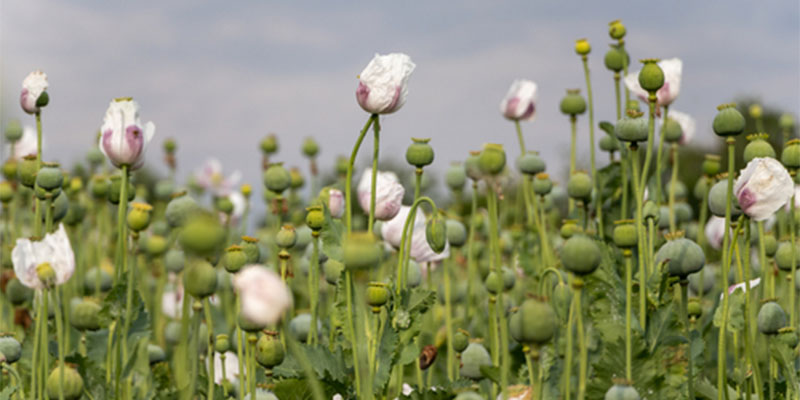Poppy research creates new cough suppressant supply chain
Posted on 4 May 2022
Researchers at York have led the development of a new commercial, high-yielding noscapine poppy variety that has transformed the supply chain for the key ingredient in many cough suppressants.

The issue
The opium poppy alkaloid noscapine has been used as an effective cough suppressant in cough medicines since the 1960s. Until 2012 the global manufacture of noscapine had focussed on its recovery as a by-product from opium production, mainly in India. The process of production from opium involved a series of inefficiencies: low concentrations of noscapine in commercial opium poppies, labour-intensive, manual lancing of green, immature poppy capsules, diversion of opium to drug traffickers and complex processing requirements to separate noscapine from other alkaloids present in opium.
The challenge for our researchers was to develop a commercial high yielding noscapine poppy that could be grown through broad acre farming to maturity (avoiding lancing), be mechanically harvested and chemically processed in a manner similar to the production of other pharmaceutical alkaloids, such as morphine and codeine.
The research
With funding from the global pharmaceutical industry and the Biotechnology and Biological Sciences Research Council, the research programme led to the discovery of a cluster of ten genes in the opium poppy genome that are responsible for producing noscapine. This allowed molecular markers to be developed that could be used to select commercial poppy lines that were able to produce noscapine, in addition to morphine and codeine.
A second major discovery of a novel gene fusion that is responsible for regulating the flux of compounds into either noscapine or morphine and codeine allowed a strategy to be developed that would result in opium poppy varieties that produce noscapine but are devoid of narcotic and psychoactive morphinan alkaloids.
The outcome
The main impact of the work has been the development of a new commercial, high yielding noscapine poppy variety that has enabled establishment of an entirely new supply chain for the important opium poppy alkaloid noscapine.
By 2017-18, deployment of new opium poppy varieties developed by our research team resulted in the production of over 25 metric tonnes of noscapine, sufficient for 1.6 billion doses, representing around 80 per cent of global demand for noscapine-containing cough suppressants.
This efficient delivery of fundamental research through to novel product and a robust IP portfolio was facilitated by a close working relationship with the two industrial partners GlaxoSmithKline (GSK 2006 – 2015) and Sun Pharmaceutical Industries (2015 – present). The speed of progress was achieved through the combination of research skills, technologies and expertise in the Centre for Novel Agricultural Products, Department of Biology at the University of York, combined with the industrial partners’ expertise in rapid product development.

Ian Graham
Professor Graham holds the Weston Chair of Biochemical Genetics. His research interests include how plants make and break down various metabolites, how these processes are controlled and how they impact on plant growth.
